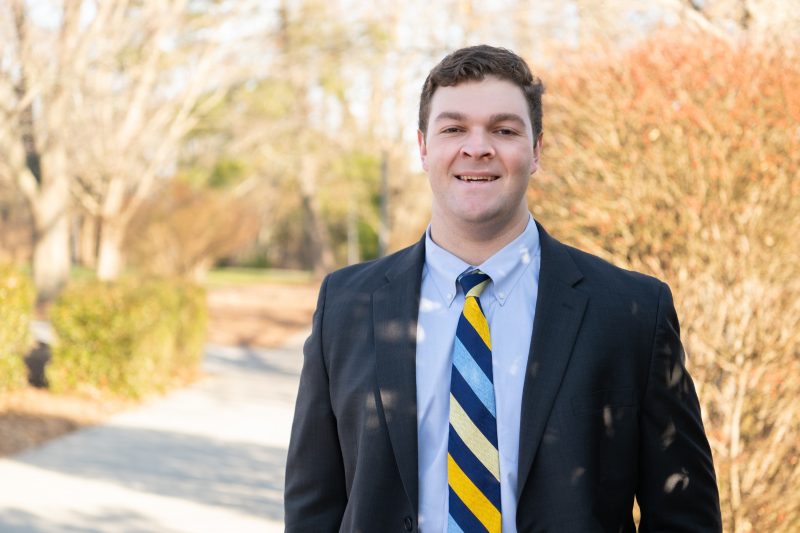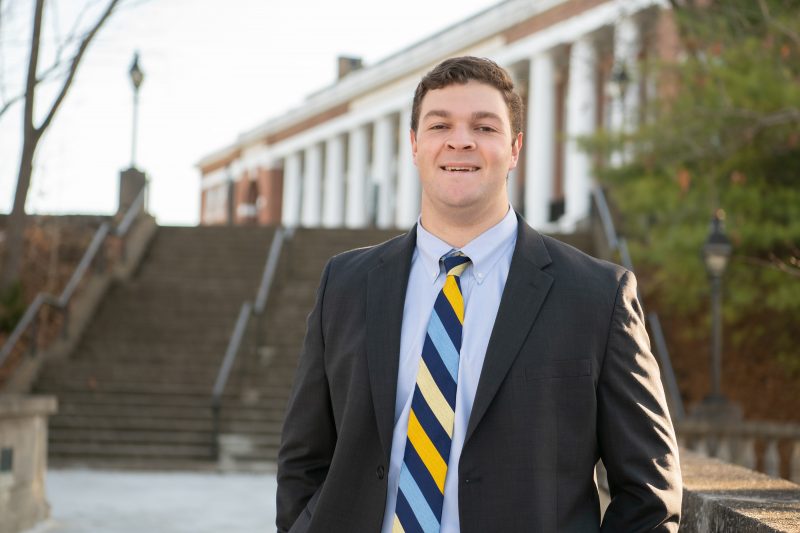‘Join the Team, Whatever It Takes’ Whether he's on the football field or in the Mock Con war room, Kyle Perel '20 never forgets about the importance of teamwork and adaptable leadership.
“This argumentative team has gotten incredibly close. I think a large reason for this is because we have actively fostered discussion and dissension from day one, we have left our egos and personal ideologies at the door, and that is why this team functions as well as it does.”
~ Kyle Perel ’20
Hometown: North Potomac, Maryland
Majors: Global Politics, Business Administration
Q: Why do politics interest you?
I became interested in politics when I was in 10th grade writing for my high school newspaper. Although I did not cover politics specifically, the newsroom was filled with political discussions and dissent. It was my personal disagreements with others in the class that motivated me to research and look into hot political topics. By my senior year, I became the opinion editor of the paper. This was during the buildup to the 2016 general election, when it seemed all anyone could talk about was Clinton vs. Trump. This inspired me to become well-versed in American politics. So, while my initial interest may have been born out of necessity in my role, I came to love politics because of the discussions it fostered.
As different types of media make politics more prevalent and important in our day-to-day lives, I have become more passionate about it; the impact it can have on me and the people around me is incredible. Political issues impact the politically engaged just as much as they do the politically disengaged. It is this importance in life that sparked and maintained my interest in politics.
Q: What does your role in Mock Con entail?
As National Political Analyst, I am charged with helping to organize the research and predictive strategy as it relates to the Democratic Presidential candidates in the 2020 primary. In this role, I have also helped organize the predictive/research system for Senate and House midterms (2018), and the hiring of our regional and state chairs (2018-2019). Furthermore, I am helping to write the rules and organizational processes for our convention in February.
Q: What’s a typical week look like for you in terms of Mock Con planning?
We do a 90-minute National Team meeting Monday mornings, a two-hour meeting that night for the Political Predictive team, and another 90-minute meeting for the Political Steering team (which includes members of the Speakers and Metadata teams) on Tuesday night. Every other week, we do an entire Steering Committee meeting on Thursday evenings. We have a saying among the political team members that Mock Con never sleeps; we are always scanning for things that can impact our predictive process, including fundraising numbers, social media interactions, varied press coverage and new polling numbers.
Q: What factors are making the prediction for this cycle of Mock Con particularly challenging or interesting?
The constant battle between historical trends and progressive change is one that keeps us on our toes. The history of Democratic primaries argues that you need to win either Iowa or New Hampshire in order to win the primary (with “the comeback kid” Bill Clinton being the most recent exception). This reflects the idea that sequence is strategy. However, history has not seen a Democratic primary field this large. At its peak, the 2020 field contained 24 candidates. There are a number of other factors that make this primary difficult to predict, including shifting party ideologies, the background of the impeachment process, and expanding technologies. Of these concepts, perceived electability and sustainable momentum are two of the hardest sub metrics to quantify. On the whole, the balance and analysis of historical trends in the face of progressive change continues to overshadow the primary.
Q: What’s it been like working with other members of the Political Department to prepare for Mock Con?
When we set out to hire our seven regional chairs, diversity of thought and opinion was incredibly important to us. This team was designed to disagree with each other; the elimination of our own individual and team-wide biases has been a focus from day one. But this argumentative team has gotten incredibly close. I think a large reason for this is because we have actively fostered discussion and dissension from day one, we have left our egos and personal ideologies at the door, and that is why this team functions as well as it does.
Q: How has your academic work at W&L helped you in this role, and has the Mock Con experience impacted your future plans?
I have been lucky enough to have professors, specifically in the Politics Department, who have focused on contemporary applications. This has been incredibly beneficial in understanding the modern electorate and today’s political processes. I also want to credit my professors for showing interest and actively engaging with me about Mock Con. Being able to discuss something so near and dear to my heart with members actively engaged in the political field has made this experience really special. Mock Con, along with other experiences I have had during my time at W&L, confirmed my desire to work in the political sphere following graduation. Last summer, I had the pleasure of working in the lobbying world with Akin Gump. After graduation, I hope to work on Capitol Hill in a congressional office. Mock Con has played a huge role in developing my interest and passion for politics, along with showing me what I want to do in life.
Q: How have you balanced Mock Con with your role as a member and captain of the W&L football team?
The reality is that football and Mock Con are starkly different in the best possible way. Leading and participating in the two requires two totally different approaches. Football by nature is an aggressive, headstrong sport. Dealing with teammates and the sport requires a parallel approach because of the physical nature. Mock Con, on the other hand, requires a more pragmatic, intellectual approach. Where the day-to-day grind of football can wear on people physically and mentally, the grind of Mock Con is different in the sense that it removes the physical aspect while perhaps increasing the mental strain. Where football is a contained organization where everyone is focused on executing their individual assignments in the grand scope of working as a team and winning games, the goals of Mock Con vary because of the focuses of each department. For example, while the Political Department is focused on getting the nomination prediction correct, the Operations Department is focused on planning and putting on the various events of Mock Con to the best of their ability. This has shown me how different types of leadership are required to motivate and deal with different situations. Different groups of people working towards different goals within different organizational structures require different approaches. During the fall, I usually went from football practice straight into Mock Con meetings. I learned to flip the switch on and off to execute and adapt my role as a leader on both the football field and in the Mock Con office to contribute and help lead each team to the best of my ability.
Q: What’s been the most exciting part of the entire Mock Con experience for you?
Similar to Washington and Lee as a whole, it is the people that have made this experience what it is. Naturally, there are disagreements, especially between teams with different areas of expertise. But the most exciting part is seeing what we produce when we work together as a group. Whether it’s Spring Kickoff, the Delegates’ Fair, social media, predictive research or coordination, to see what this group of people can put together has been and will continue to be truly remarkable. Because events like the Delegates’ Fair and the Presidential Gala are so different, Mock Con really brings out the best in everyone across the organization.
Q: What advice would you give a first-year or prospective student who is thinking about getting involved in Mock Con?
Start early if it is something you are interested in. Looking back on this process, I started in the winter of my first year when I applied to be political chair. When that didn’t work out, I applied to be national political analyst the following year. Even if you don’t get the position you initially want, Mock Con is a massive organization, and as such requires a tremendous amount of personnel. There will be more opportunities down the road to apply for positions across a variety of interests and areas of focus. If you are empowered by the mission, join the team, whatever it takes.
If you know any W&L students who would be great profile subjects, tell us about them! Nominate them for a web profile.
 Kyle Perel ’20
Kyle Perel ’20 Kyle Perel ’20
Kyle Perel ’20
You must be logged in to post a comment.